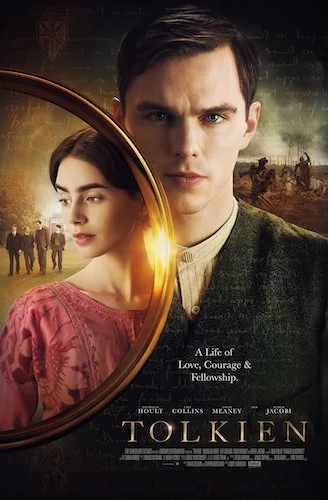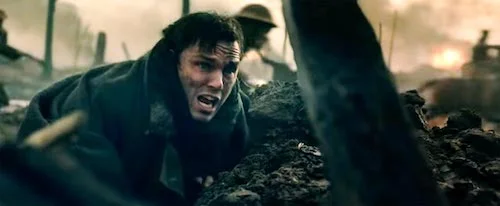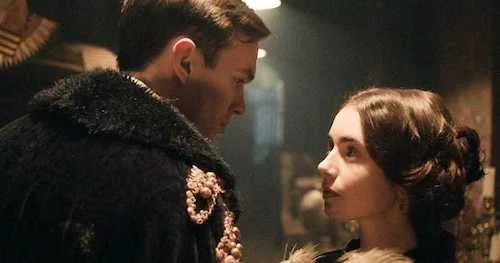Tolkien
If any of you want to get into critical writing and film reviewing, Tolkien is one of the hardest types of films to write about. Nothing about it is absolutely brilliant, but nothing about it is absolutely terrible. It just exists. Think of this case as if it were a meal. Have you ever had an amazing meal where all of the flavours flowed together, and it dictated all of your senses at once? You can discuss its wonder for hours. What about the grossest taste ever? One second, and you gag. You spit it out. You rant that you cannot get the taste out of your mouth. These are experiences that are starkly different, yet you have so much lexiconic context to work with. All of the attempts to recreate a positive or a negative. The challenge to figure out how to detail a experience when words just aren’t enough (yet that’s all you have).
Then, there is the television dinner you heat up, wharf down, and forget you’ve had as you channel flip; you then bring out the potato chips, and continue to have too many of those, too. It’s no longer a meal, but a subconscious action. It’s as if you felt nothing, so you try again. You keep doing this, until it means something. You get too full, and that’s that. No satisfaction. No extreme dissatisfaction to even write home about. You just know that you spent some time doing this, and now you’re onto the next thing. This is Tolkien: a biographical picture of literary legend J.R.R. Tolkien that just reminds us that Tolkien was brilliant, but we never really connect with why he is.
J.R.R. Tolkien surviving the first World War.
The problem is Tolkien hovers around the facts of J.R.R. Tolkien, but it doesn’t instil a life into them. The fascination with the words “cellar door”. The toll of war on his life. His childhood problems. From the trivial to the establishing, Tolkien only thrives on facts. These can be from Wikipedia, Trivial Pursuit, or word of mouth. If Tolkien ever cemented something with his works, it’s that a lot can come from small packages, whether it be a character, or the actual character (a hobbit with many surprises). Here, the facets barely carry any weight, and the actual characters are only ever brought to life by five components: Nicholas Hoult, Lily Collins, the child actors, the alluring cinematography, and the majestic score. Otherwise, this is a lecture on lessons you already had during last year’s semester.
Another thing Tolkien stood for was to be daring. He told tales of political struggle, social inequalities, warfare and unity through fantasy in such a way that non-fantasy fans still adore his works. Count me in. We get a different angle on everyday discussions and debates. We don’t even need anything epic, here, but Tolkien is so blasé with what it is trying to say. Take one of the war scenes, for instance. Just showing Tolkien imagining a dragon, only for flamethrowers to appear right afterwards, is telling us “Tolkien connected dragons to a deadly war”. Cinema is a beautiful medium, because it is one different form of connectivity. Don’t tell us this. Make us feel this. Have an ambience set, where we experience more of the war at once (as opposed to just chunks), and have us truly feel the need to cling onto a mother’s tales to get through the worst moments of one’s life. With scene building, we don’t get told that Tolkien did this, but we live as him for a minute or two, and we understand it all. Fact-hopping creates a timeline, not a story.
Tolkien and Edith Bratt, his romantic partner.
Just think about this: Tolkien has had fans for over half a century. Not just fans. Super fans. People who learn the various languages in his works. People who know each and every little thing about the geographical locations he created. I’m not even going to try and go toe-to-toe with any of them: the Lord of the Rings trilogy is one of my all time favourites, but I would definitely get destroyed in a competition against another fan. My point is, try searching “Tolkien” and “World War I” online, and you will see an abundance of YouTube videos from years ago. This is just during the social media age. This is all stuff that Tolkien super fans already know. Anyone unfamiliar with his works or life will only get the barest takes, here. So, newcomers won’t get a proper context, and aficionados already know all of this in spades.
I will stick by a film like Never Look Away, as imperfect as it is, because it truly captured the moment where an artist discovered his niche. The bulb went off with what he can bring that is new to the world. This is through patience, and serious creation of atmosphere. It even includes many of the same themes that Tolkien has: romance, trauma, and inspiration. With Tolkien, all that’s new are the words given to these souls that they most likely did not say verbatim. I don’t know who to blame. Is it the screenwriter, who felt the bare basics would do? Is it the editor, who slapped scenes together that don’t really bounce off one another in any way? Is it the director, who okay’d this all? Is it the producers, who just said “a film about J.R.R. Tolkien is all we need”, rather than “Let’s truly make this work?”
I’m supposed to feel something when Tolkien is gasping for life in a muddy trench, trying to discuss what may be his final moments with his friend Sam. The parallel to the Sam that Tolkien wrote about is too strong. However, there is nothing. We’re just told this happened. We do not experience it. What made Bilbo’s adventures actual adventures, is that Tolkien laid enough textual groundwork that we felt every step. The Lord of the Rings trilogy connects with audiences, because it made sure to go to each and every reader, and detail them in a new way. Tolkien was all about inclusion of the reader; this fantasy world was still about us. Tolkien forgets this, and it is sadly tremendously disengaging.
Andreas Babiolakis has a Masters degree in Film and Photography Preservation and Collections management from Ryerson University, as well as a Bachelors degree in Cinema Studies from York University. His favourite times of year are the Criterion Collection flash sales and the annual Toronto International Film Festival.






